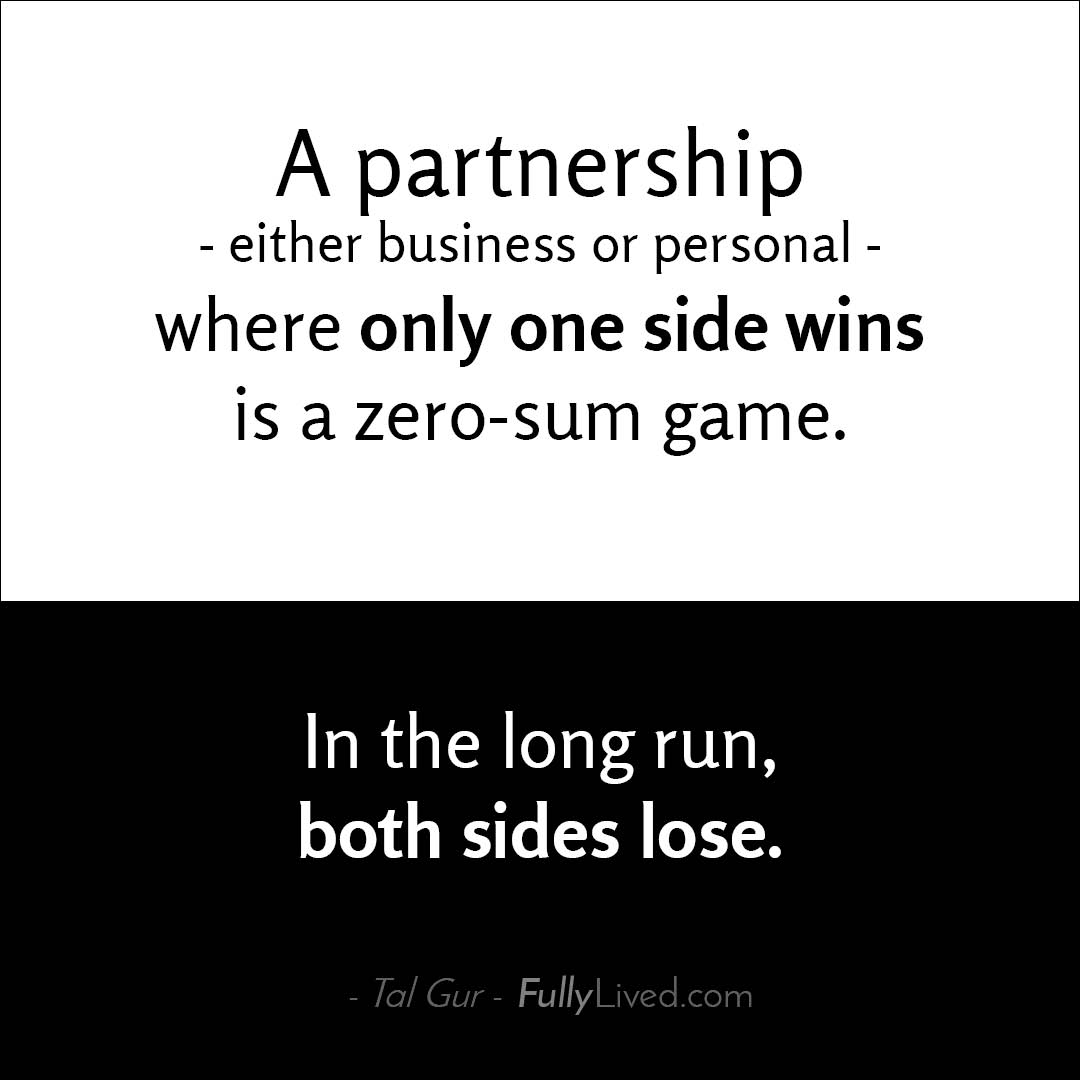A partnership – either business or personal – where only one side wins is a zero-sum game. In the long run, both sides lose.
Imagine a vast ocean stretching out before you, its surface shimmering under the sun's golden rays. In this vast expanse, there are countless boats sailing, each representing a partnership, be it in business or personal relationships. Now, picture one boat rowing tirelessly forward while the other remains stagnant, anchored by the weight of selfishness and greed. This scene encapsulates the essence of the profound truth behind the statement: a partnership where only one side emerges victorious is ultimately doomed to failure.
Consider this scenario: You're embarking on a journey with a friend, each of you entrusted with a paddle to navigate the waters ahead. In an ideal partnership, both individuals exert equal effort, synchronizing their movements to propel the boat forward harmoniously. However, if one party decides to slack off, leaving the burden of rowing solely to the other, the imbalance becomes glaringly evident. While the lazy companion may relish a temporary respite, basking in the comfort of their inaction, the consequences soon manifest. The boat veers off course, progress stalls, and frustration festers, poisoning the once-promising voyage.
In the realm of business, the concept remains unchanged. Picture two entrepreneurs joining forces to launch a startup, their visions aligned, and their goals intertwined. Initially, the partnership flourishes as they pool their resources, expertise, and determination. Yet, if one partner begins prioritizing personal gain over collective success, the foundation crumbles beneath the weight of distrust and resentment. The scales tip, skewing the delicate equilibrium that once sustained their venture. While the opportunistic partner may revel in short-term gains, the venture is left vulnerable, teetering on the brink of collapse.
The analogy of a seesaw offers another perspective on this universal truth. Picture two children frolicking in a playground, delighting in the simple pleasure of the seesaw's rhythmic rise and fall. When both children exert equal force, the seesaw remains balanced, allowing for an enjoyable experience for both. However, if one child decides to leap off abruptly, leaving their companion suspended in mid-air, the joyous play descends into chaos. The abandoned child plummets to the ground, robbed of their laughter, while the selfish perpetrator faces the consequences of their actions.
At its core, the essence of partnership lies in reciprocity and mutual benefit. Just as a gardener tends to their plants, nurturing them with care and attention, a successful partnership requires constant cultivation. Each party must contribute their fair share, watering the seeds of trust, communication, and collaboration. In doing so, they foster an environment where both parties can thrive, reaping the fruits of their collective labor.
History is replete with cautionary tales of partnerships soured by greed and self-interest. From business tycoons to political alliances, the consequences of imbalance reverberate through the annals of time. The tale of the Tortoise and the Hare serves as a timeless allegory, illustrating the perils of complacency and arrogance. While the hare's overconfidence leads to his downfall, the tortoise's steady perseverance propels him to victory. In the grand tapestry of life, success is not measured by individual achievements but by the strength of the bonds we forge and the legacy we leave behind.
In conclusion, the adage rings true: a partnership where only one side wins is a zero-sum game. Like a delicate ecosystem, it thrives on equilibrium, with each component playing a vital role in sustaining the whole. As we navigate the tumultuous waters of life, let us remember that true fulfillment lies not in self-serving pursuits but in the enrichment of those around us. Let us strive to be architects of harmony, weaving a tapestry of cooperation and goodwill that transcends the boundaries of self-interest.
Now, reflect on your own partnerships, be they personal or professional. Are you fostering an environment of mutual respect and reciprocity, or are you inadvertently perpetuating a zero-sum game? How can you contribute to the collective success and well-being of those around you?
* To gain more inspiration and motivation for your personal growth journey, I recommend visiting my SMART goals page, which offers a wide range of goal ideas to help you establish new aspirations and achieve greater success in life. This list was crucial in the development of my own life goals list, consisting of 100 goals that I pursued for ten years.
Chief Editor
 Tal Gur is an author, founder, and impact-driven entrepreneur at heart. After trading his daily grind for a life of his own daring design, he spent a decade pursuing 100 major life goals around the globe. His journey and most recent book, The Art of Fully Living, has led him to found Elevate Society.
Tal Gur is an author, founder, and impact-driven entrepreneur at heart. After trading his daily grind for a life of his own daring design, he spent a decade pursuing 100 major life goals around the globe. His journey and most recent book, The Art of Fully Living, has led him to found Elevate Society.























